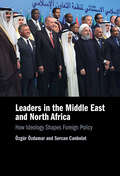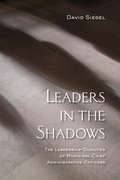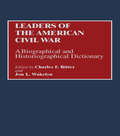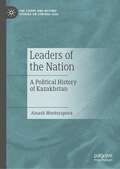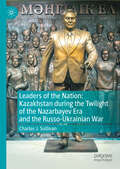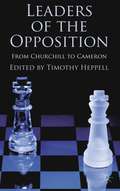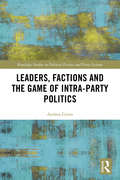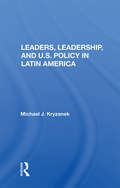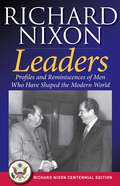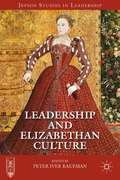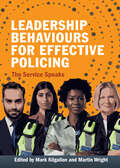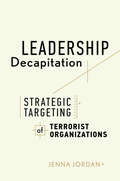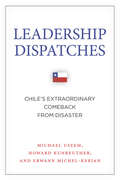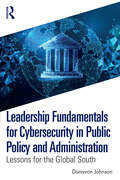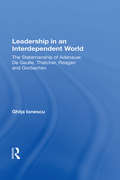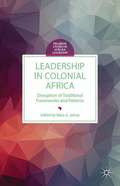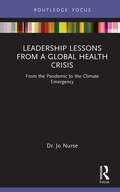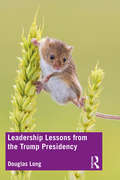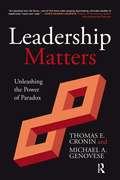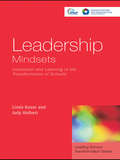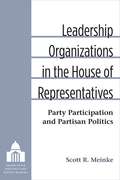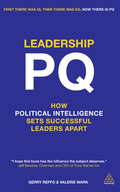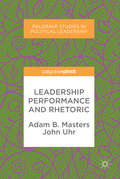- Table View
- List View
Leaders in the Middle East and North Africa: How Ideology Shapes Foreign Policy
by Özgür Özdamar Sercan CanbolatThe study of politics in the MENA region has traditionally been dominated by historical and case study approaches. In this innovative book, Özgür Özdamar and Sercan Canbolat instead adopt a social science-based methodology to reconsider the dynamics of power and leadership in Africa and the Middle East. By analysing the psychological profiles of fourteen leaders across eight countries and three non-state organizations, they develop a nuanced portrait of modern leadership. Using this approach, the authors are able to draw connections between apparently disparate political ideologies, from Sunni Islamism to Shia revolutionism, from secular nationalism and armed non-state groups. Demonstrating the previously unacknowledged commonalities and divergences in these leaders' approaches, Özdamar and Canbolat illuminate their tactics and strategies and offer novel insights into how best to negotiate with them.
Leaders in the Shadows
by David SiegelIn most municipalities across Canada, the top public servant is the chief administrative officer (CAO) or city manager. Compared to elected politicians such as the mayor and the council, the work of a CAO is often overlooked and not well understood. In Leaders in the Shadows, David Siegel brings the CAO into the limelight, examining the leadership qualities of effective municipal managers.Using the examples of five exceptional CAOs who have worked in municipalities of varying sizes across Canada, Siegel identifies the leadership traits, skills, and behaviours which have made them successful. Interweaving the stories of his subjects with insights drawn from leadership theory, Siegel offers an engrossing account of how CAOs must lead "up, down, and out" in order to succeed. Offering well-rounded accounts of the challenges and opportunities faced by public servants at the municipal level, Leaders in the Shadows is a valuable resource for academics and practitioners alike.
Leaders of the American Civil War: A Biographical and Historiographical Dictionary
by Jon L. Wakelyn Charles F. RitterProvides an overview of the careers of the great military leaders and the critical political leaders of the American Civil War. Entries consider the leader's character and pre-war experience, their contributions to the war effort, and the war's impact on the rest of their lives. An assessment of their historical treatment puts their long-term reputations on the line, and results in a thorough revision of some leaders, a call for further study of others, and a reaffirmation of the accomplishments of the greatest leaders.
Leaders of the Nation: A Political History of Kazakhstan (The Steppe and Beyond: Studies on Central Asia)
by Ainash MustoyapovaThe book tells about people who lived in an era of historical cataclysms, wars and revolutions, changes in political formations. The generation of the Kazakh intelligentsia responded to the historical challenge facing the Kazakhs at a turning point in history. These are people born at the end of the 19th century, educated in different countries and united by the idea of overcoming colonial dependence on the Russian Empire.The author aims to form a holistic view of a galaxy of outstanding personalities who, in an important historical period, were able to take responsibility for the people and their future. The history of the country is perceived through the prism of their destinies, views, activities and death.The material of the book is a biographical sketch and covers the history of Kazakhstan in the first third of the twentieth century, until the period of the Great Terror (1937–1938).
Leaders of the Nation: Kazakhstan during the Twilight of the Nazarbayev Era and the Russo-Ukrainian War
by Charles J. SullivanThis book provides an overview of the major developments in Kazakhstan over the past decade. In analyzing a series of challenges (such as the need on behalf of the current Kazakh president – Kassym-Jomart Tokayev – to restore legitimacy in the government in the aftermath of "Bloody January" as well as Astana’s managing of relations with Russia, China, and the West), this book offers readers a timely understanding concerning how power has been wielded, mishandled, and reasserted in this country. This book explores the achievements of Kazakhstan’s modernization drive, the government’s prolonged initial political transition, the rise of a local civil society, the events of January 2022, and Kazakhstan’s relations with Russia and the West. Written by a political scientist who previously worked at the country’s flagship university, Leaders of the Nation: Kazakhstan during the Twilight of the Nazarbayev Era and the Russo-Ukrainian War outlines why Kazakhstan warrants our earnest attention.
Leaders of the Opposition
by Timothy HeppellTimothy Heppell brings together a renowned group of contributors to consider the role of the Leader of the Opposition in British Politics. The book argues that the neglect of opposition studies needs to be addressed, especially given the increasing importance attached to the performance the Leader of the Opposition in the British political system.
Leaders, Factions and the Game of Intra-Party Politics (Routledge Studies on Political Parties and Party Systems)
by Andrea CeronThe book provides a comprehensive view on the internal life of parties and investigates the dynamics of intra-party politics in different party environments to explain in which circumstances the party leader is more or less bound by the wills of party factions. Analyzing almost 500 intra-party documents from Italy, Germany and France, it presents a theory of intra-party politics that illuminates internal decision-making processes and sheds light on the outcomes of factional conflicts on the allocation of payoffs within the party, on the risk of a party split and on the survival of the party leader. Using text analysis, the results show that consensual dynamics can allow to preserve party unity and that directly elected leaders can exploit their larger autonomy either to reward followers or to prevent splits. This text will be of key interest to scholars and students of Party Politics, Political Institutions, European Politics and more broadly to Comparative Politics, Political Theory and Text Analysis.
Leaders, Leadership, And U.s. Policy In Latin America
by Michael J. KryzanekThis book focuses on the future of Latin American leaders and the relationship of these leaders to the United States. It examines the ways in which the critical interaction between individual leaders and the U.S. policy community affects the substance and direction of hemispheric relations.
Leaders: Profiles and Reminiscences of Men Who Have Shaped the Modern World
by Richard NixonWhen Nikita Khrushchev shouted contempt for the United States in his famous “Kitchen Debate” with Vice President Richard Nixon, Americans gasped at the sudden glimpse of the Soviet leader's character. At the time cameras and reporters were present. But how much more would we have learned if we could have traveled the globe with Richard Nixon and met privately with others who have shaped the modern world? Richard Nixon knew virtually every major foreign leader since World War II—some at the pinnacle of power, some during their “years in the wilderness” out of power, and still others toward the end of their lives. His was an unparalleled opportunity to gain insight into the nature of the powerful and qualities of leadership. In Leaders, Nixon shares these insights and experiences. He illustrates these leaders in private, assesses their careers, recalls words of wisdom, and brings to bear his own judgments. We meet the co-architects of the New Japan, Douglas MacArthur and Shigeru Yoshida. Encountering the legendary leaders of China—Mao Zedong, Zhou Enlai, and Chiang Kai-shek—we see the men behind the events. We see the intensely private Charles DeGaulle; explore the philosophies of Konraud Adenauer; confront Leonid Brezhnev; and delight in the company of Winston Churchill—not to mention Nixon’s analyses of interactions with dozens of other leaders. No one but Richard Nixon could have written this book. It is at once as personal as a handclasp and as objective as only so earnest a student of history could have made it.
Leadership And Culture
by Annie Hondeghem Montgomery Van Wart Erwin Schwella Paul SuinoThis collection examines the leadership training of public administration in 19 countries and provides information on where, what, and how the training occurs as well as the up-to-date cultural, political, economic background for each. Factors affecting perceived importance, quality and robustness of top civil servant training are examined.
Leadership And Elizabethan Culture
by Peter Iver KaufmanLeadership an Elizabethan Culture studies the challenges confronted by government and church leaders (local and central), the counsel given them, the consequences of their decisions, and the views of leadership circulating in late Tudor literature and drama.
Leadership Behaviours for Effective Policing: The Service Speaks
by Martin Wright Mark KilgallonAn essential handbook of policing leadership behavioural skills for both professional police officers and policing students aspiring to join the force. The behaviours examined are of relevance to all ranks and roles, from a newly appointed police constable to an executive officer.Behavioural soft skills are essential to effective policing practice and professional development, and are particularly significant in leadership and management roles. This handbook examines the key leadership behaviours and focuses on discreet aspects within policing as well as describing a career timeline. In addition it provides a unique opportunity for leaders to articulate the effects the Covid-19 pandemic has had on law enforcement, examining the impact on policing behaviours and what the blockages are.Each chapter is written by a well-established serving police leader or policing scholar, bringing together a wealth of experience and understanding and applying this knowledge in context through key case studies and examples. It bridges the gap between theory and practice so readers can apply what they have learnt to their policing roles and effectively formulate and describe their own leadership philosophy and style.This is a companion book to Behavioural Skills for Effective Policing.
Leadership Decapitation: Strategic Targeting of Terrorist Organizations (Studies in Violence and Terrorism)
by Jenna JordanOne of the central pillars of US counterterrorism policy is that capturing or killing a terrorist group's leader is effective. Yet this pillar rests more on a foundation of faith than facts. In Leadership Decapitation, Jenna Jordan examines over a thousand instances of leadership targeting—involving groups such as Hamas, al Qaeda, Shining Path, and ISIS—to identify the successes, failures, and unintended consequences of this strategy. As Jordan demonstrates, group infrastructure, ideology, and popular support all play a role in determining how and why leadership decapitation succeeds or fails. Taking heed of these conditions is essential to an effective counterterrorism policy going forward.
Leadership Dispatches: Chile's Extraordinary Comeback from Disaster
by Michael Useem Howard Kunreuther Erwann Michel-KerjanOn February 27, 2010, Chile was rocked by a violent earthquake five hundred times more powerful than the one that hit Haiti just six weeks prior. The Chilean earthquake devastated schools, hospitals, roads, and homes, paralyzing the country for weeks and causing economic damage that was equal to 18 percent of Chile's GDP. This calamity hit just as an incumbent political regime was packing its bags and a new administration was preparing to take office. For most countries, it would have taken years, if not decades, to recover from such an event. Yet, only one year later, Chile's economy had reached a six percent annual growth rate. In Leadership Dispatches, Michael Useem, Howard Kunreuther, and Erwann Michel-Kerjan look at how the nation's leaders-in government, business, religion, academia, and beyond-facilitated Chile's recovery. They attribute Chile's remarkable comeback to a two-part formula consisting of strong national leadership on the one hand, and deeply rooted institutional practices on the other. Coupled with strategic, deliberative thinking, these levers enabled Chile to bounce back quickly and exceed its prior national performance. The authors make the case that the Chilean story contains lessons for a broad range of organizations and governments the world over. Large-scale catastrophes of many kinds-from technological meltdowns to disease pandemics-have been on the rise in recent years. Now is the time to seek ideas and guidance from other leaders who have triumphed in the wake of a disaster. In this vein, Leadership Dispatches is both a remarkable story of resilience and an instructive look at how those with the greatest responsibility for a country, company, or community should lead.
Leadership Fundamentals for Cybersecurity in Public Policy and Administration: Lessons for the Global South
by Donavon JohnsonIn an increasingly interconnected and digital world, this book provides comprehensive guidance on cybersecurity leadership specifically tailored to the context of public policy and administration in the Global South.Author Donavon Johnson examines a number of important themes, including the key cybersecurity threats and risks faced by public policy and administration, the role of leadership in addressing cybersecurity challenges and fostering a culture of cybersecurity, effective cybersecurity governance structures and policies, building cybersecurity capabilities and a skilled workforce, developing incident response and recovery mechanisms in the face of cyber threats, and addressing privacy and data protection concerns in public policy and administration. Showcasing case studies and best practices from successful cybersecurity leadership initiatives in the Global South, readers will gain a more refined understanding of the symbiotic relationship between cybersecurity and public policy, democracy, and governance. This book will be of keen interest to students of public administration and public policy, as well as those professionally involved in the provision of public technology around the globe.
Leadership In An Interdependent World: The Statesmanship Of Adenauer, Degaulle, Thatcher, Reagan And Gorbachev
by Ghita IonescuThis book is an inquiry into modern statesmanship or, as the title indicates, into statesmanship in the age of interdependence. In form, it consists of an examination of the statesmanship of five people, namely Konrad Adenauer, Charles de Gaulle, Mrs Margaret Thatcher, Ronald Reagan and Mikhail Gorbachev, with special reference to the way in which
Leadership In Colonial Africa
by Baba G. JallowLeadership in Colonial Africa highlights colonial disruptions of traditional leadership patterns in Africa and how African leaders, traditional and nationalist, reacted to these disruptions.
Leadership Lessons from a Global Health Crisis: From the Pandemic to the Climate Emergency (Routledge Focus on Environmental Health)
by Jo NurseThis book explores the key learning for global leadership in the face of modern international health crises and argues the need for fundamental reform to governance paradigms, within the global security sphere and policymaking circles. Beginning with an analysis of the worldwide response to the COVID-19 pandemic, the book provides insights from evolution, history, and human behaviour to explain how our current leadership paradigms have contributed to today’s global health challenges, and draws lessons for the much larger crisis of climate change with the threat of massive biodiversity collapse. The second part of the book outlines tangible solutions to transform leadership and policy to enhance global security for both People and the Planet, with the aim of averting future Pandemics and our Planetary Emergency. This book: Will be among the first published works to examine the international response to the COVID-19 pandemic, and draws valuable lessons for our Climate Crisis. Directly addresses the nexus between scientific advice and policymaking, highlighting its need for remedial action in the wake of 2020 global health crises. Provides a bridge between public health, the environment and leadership. This book will prove an insightful resource for current and future world leaders, politicians and policymakers, as well as Environmental and Public Health professional bodies, think tanks and institutions shaping the next generation of leadership.
Leadership Lessons from the Trump Presidency
by Douglas G. LongThis book seeks to demonstrate that we can learn from both 'good' and 'bad' leaders. Part One looks at President Trump’s behaviour from inauguration to impeachment. The ancient Greek concepts of Kairos and Chronos are used to indicate that Trump was almost a natural fit for the US of 2017. Part Two considers the consequences of his behaviour on the US, the world at large, and for leadership overall. There is a temptation to consider only 'good' leaders when asking what we can learn from others. This book explores the issue of what can be learned from any person in a leadership role, no matter what the value judgement we make of them. Part One explores Trump’s behaviour up to the moment of impeachment and the longer-term residual impacts this will have once his term as President is over. It shows that our value judgements tend to be based on perception and a priori assumptions. Part Two explores what we can learn from the Trump event no matter what our leadership role. Disruption is endemic in today’s world. Today, it often seems that we are born, live, and die, in three quite different worlds. Yet, at its core, things have changed very little. Oligarchy has been a reality since time immemorial. Unless we are first 'unfrozen' from the status quo, change tends to be more cosmetic than actual. Donald Trump’s presidency has the potential to be the thawing agent that could enable 'real' change through which new forms of both democracy and capitalism might emerge across the world.
Leadership Matters: Unleashing the Power of Paradox
by Thomas E. Cronin Michael A. GenoveseSome leaders fundamentally alter the status quo whilst others guide quietly. Most leadership books emphasise specific rules, but Tom Cronin and Michael Genovese see leadership as filled with paradox. Leadership Matters offers a different view of leadership - one that builds community and responds creatively to new situations. Cronin and Genovese argue that leadership is about more than just charisma and set leaders on to a different path - to unleash the power of paradox.
Leadership Mindsets: Innovation and Learning in the Transformation of Schools (Leading School Transformation)
by Linda Kaser Judy HalbertThe evidence is clear - school leaders make a difference to the learning of the pupils they serve. And yet, not all leaders have the same degree of impact. What are the factors that make the difference to student learning? Why are some leaders able to raise student achievement in schools in the most challenging circumstances whilst other leaders struggle to simply maintain the status quo? Drawing from international case study research over many years, from the experience of hundreds of school leaders serving widely diverse communities, Judy Halbert and Linda Kaser argue that there are six distinct mindsets that characterize the way successful, learning-oriented leaders operate and make sense of their professional world. These leaders are: motivated by intense moral purpose knowledgeable about current models of learning consistently inquiry-oriented able to build trusting relationships evidence-informed able to move to wise action. This book outlines an alternative way of thinking about school leadership. It examines research evidence that leaders will find most useful and suggests how they might use this evidence to maximise their learning and the learning of their students. Leadership Mindsets has been written specifically for aspiring to newly-appointed school leaders who are determined and motivated to create quality and equality for learners in the schools they serve, through networks of inquiry, learning and support.
Leadership Organizations in the House of Representatives: Party Participation and Partisan Politics
by Scott MeinkeIn recent Congresses, roughly half of the members of the U.S. House of Representatives served in whip organizations and on party committees. Rank-and-file representatives who use party service to advance their own careers benefit from this growing rate of participation in the party hierarchy, as do the party leaders who use participation in order to advance the party's agenda through coordination, communication, and persuasion. According to Scott R. Meinke, however, rising electoral competition and polarization over the past 40 years have altered the nature of party participation. In the 1970s and 1980s, the participation of a wide range of members was crucial to building consensus. Since then, in the partisan battle for control of the chamber, organizations responsible for coordination in the party have become dominated by those who follow the party line. At the same time, key leaders in the House use participatory organizations less as forums for internal deliberations over policy and strategy than as channels for exchanging information with supporters outside Congress and broadcasting sharply partisan campaign messages to the public. This transformation of leadership organizations generally serves a party's collective goals in an era of close electoral competition and ideological polarization. Yet it also hinders a party's ability to reach a strategic consensus over divisive issues and to develop its own policy alternatives.
Leadership PQ
by Valerie Wark Gerry ReffoPolitical Intelligence (PQ) is a new leadership requirement that will allow governments and businesses to build relationships and work together in a new and more effective way. Successful leaders have built the capability to interact strategically in a world where government and business share power to shape the future. Leadership PQ explains why political intelligence is now a critical leadership requirement; presents exclusive case studies and interview material to demonstrate the impact of PQ in action; and provides practical advice to on how to develop it by effectively navigating the Golden Triangle of business, government and society.
Leadership PQ: How Political Intelligence Sets Successful Leaders Apart
by Valerie Wark Gerry ReffoIQ and EQ (Emotional Intelligence) are not enough. Creating profit, growth and a better future for society is the new leadership challenge. In a shared power world, no single organization is in control or can deliver alone. Leadership PQ is for leaders working with multiple stakeholders to achieve more together. Shortlisted for the CMI Management Book of the Year 2014/15, Leadership PQ introduces a new leadership requirement, PQ (political intelligence) that will allow governments and businesses to build relationships and work together in a new and more effective way. Successful leaders have built the capability to interact strategically in a world where government and business share power to shape the future. Leadership PQ explains why political intelligence is now a critical leadership requirement, presents exclusive case studies and interview material to demonstrate the impact of PQ in action, and provides practical advice to on how to develop it by effectively navigating the Golden Triangle of business, government and society. Leadership PQ is targeted at: business leaders at a multinational and local level; leaders involved in public policy and delivery; leaders of non-profit organizations; executive teams; and aspiring leaders in all sections. While each sector features different challenges, PQ can give them greater reach and impact.
Leadership Performance and Rhetoric
by John Uhr Adam B. MastersThis book examines both the rhetorical content of contemporary public leadership and the leadership methods pioneered by early English statesman Sir Francis Bacon. In particular, it considers the use of public rhetoric to defend leadership legitimacy in six case studies, drawing on leadership contests in recent Australian political history. The authors map out the complex language of leadership in contemporary politics through chapter-length portraits of the inter-related political rhetoric of prime ministers Rudd, Gillard, Abbott and Turnbull, plus former foreign minister Bob Carr and indigenous leader Noel Pearson. The process is a novel application of leadership analysis derived from the political philosophy of Francis Bacon, who emerges as a founder of the study, and indeed practice, of political and public leadership. The book will appeal to students and scholars across the fields of political science, communication and rhetorical studies, and political history.
